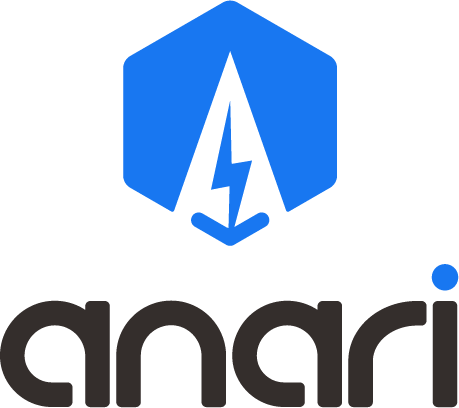Electrifying the Future: Why Dutch Fleets Are Going Electric?
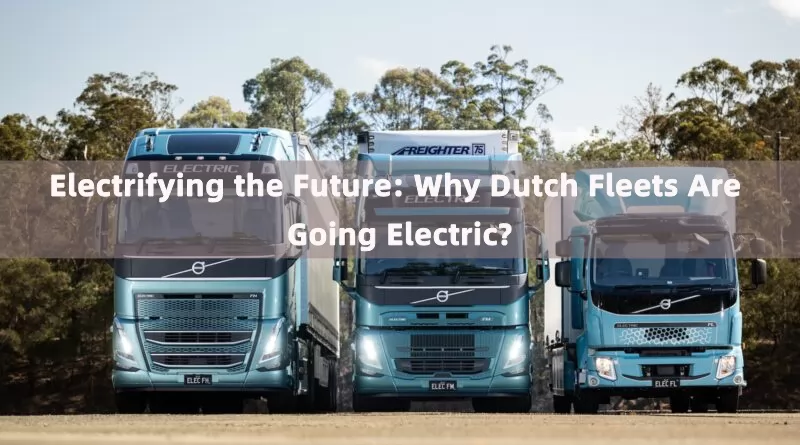
1. Fleets of Commercial Electric Vehicles in the Netherlands
The Netherlands is a frontrunner in adopting electric mobility, particularly in the realm of commercial electric vehicles (EVs). Several key factors drive the trends for commercial EV fleets in the country:
Sustainability Goals
With a strong commitment to green policies, the Netherlands aims to significantly reduce carbon emissions. Electric commercial vehicles play a pivotal role in achieving these climate goals, especially in urban areas with stringent environmental regulations.
Fleet Size and Diversity
Businesses of all sizes, from large logistics companies to small enterprises, are transitioning to EVs. This includes a wide range of vehicles, from small delivery vans to large trucks, particularly in cities like Amsterdam, Rotterdam, and The Hague, where strict emissions standards are enforced.
Government Incentives
The Dutch government offers various incentives to encourage fleet electrification, including subsidies, tax exemptions, lower registration fees, and grants for charging infrastructure. These policies make battery electric vehicles (BEVs) an attractive option for fleet owners.
Urban Logistics Focus
Given the Netherlands' dense population and high demand for urban deliveries, companies are increasingly adopting electric delivery vans and trucks. These vehicles enable zero-emission operations, aligning with the needs of urban logistics.
2. Challenges for Commercial Electric Vehicles in the Netherlands
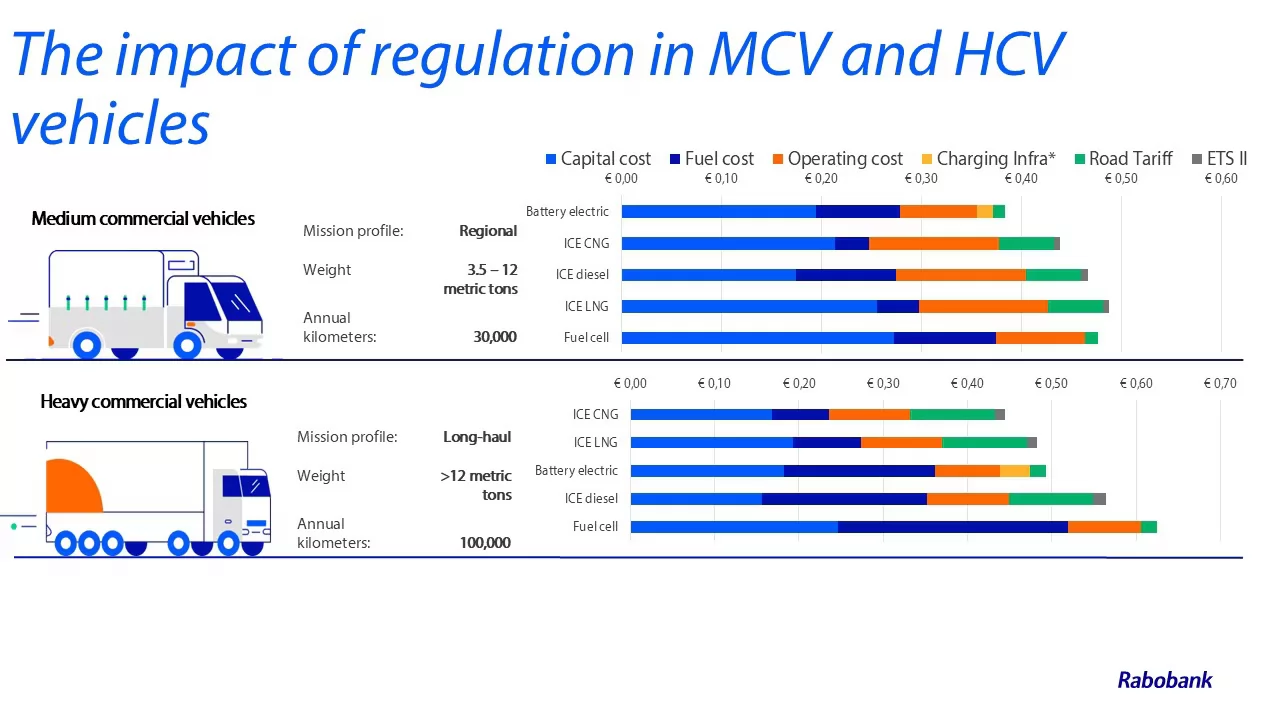
Note: Charging infrastructure must have the capacity to fully recharge a vehicle to 100% in an hour or less. We have assumed one charger per four vehicles. Source: RaboResearch 2025
While the Netherlands is advanced in adopting EVs, there are still several challenges for commercial electric truck fleets:
Range Anxiety
While the range of commercial EVs has improved, long-haul trucks still face range limitations. Companies require greater assurance that these vehicles can handle extended trips without frequent recharging.
Charging Infrastructure
The Netherlands boasts one of the most advanced EV charging networks in Europe, but the specific needs of commercial vehicles, particularly large trucks, strain existing infrastructure. High-powered, fast-charging stations tailored for trucks are still in demand.
Vehicle Cost
The upfront cost of electric commercial vehicles remains higher than that of internal combustion engine (ICE) counterparts. Although operational costs are lower over time, the initial investment can deter fleet operators without sufficient financial incentives.
Battery Lifespan & Recycling
The long-term sustainability of battery production, lifespan, and disposal poses challenges for large fleets. Advances in battery technology and efficient recycling or repurposing solutions are needed to address these concerns.
TCO (Total Cost of Ownership) Uncertainty
Fleet operators often struggle to accurately assess the total cost of ownership for electric trucks due to uncertainties surrounding battery lifespan, maintenance costs, and vehicle resale value.
3. Trends in Commercial Electric Vehicle Adoption
Transition to Electrification
Fleet operators are steadily electrifying their vehicles to comply with regulatory requirements and meet sustainability goals. This trend is particularly strong for short-range deliveries and medium-duty trucks operating within city limits.
Focus on Heavy-Duty EV Trucks
There is increasing interest in electrifying heavy-duty trucks for long-haul transportation, driven by advancements in battery technology and expanding charging infrastructure.
Electrification of Last-Mile Delivery
Logistics companies are investing heavily in electric trucks for last-mile delivery to reduce urban congestion and pollution, aligning with the Netherlands' urban-focused sustainability initiatives.
Collaboration with Charging Providers
Fleet operators are forming partnerships with charging infrastructure providers to integrate charging stations seamlessly into their fleet management systems, ensuring efficient operations.
4. Relevant DC Products of Anari Energy for the Dutch Fleet Market
Anari Energy specializes in high-performance Direct Current (DC) charging solutions for EVs. Their products align well with the needs and challenges of the Dutch commercial fleet market:
High-Power DC Fast Chargers
Anari Energy’s DC fast chargers are ideal for addressing the demand for rapid charging solutions for commercial vehicles, particularly trucks. These chargers can minimize downtime for fleets operating on tight schedules, supporting urban logistics hubs and highway routes.
Ultra-Fast Charging Stations for Fleets
Anari’s ultra-fast charging stations cater to the needs of electric delivery trucks in urban settings, enabling quick recharging during off-hours or short breaks. These stations can be deployed in fleet depots or strategically located charging hubs in cities and logistics centers.
Fleet Charging Management Software
Anari may offer fleet management software integrated with their DC charging systems. This software helps operators optimize energy use, monitor charging patterns, and schedule charging times, reducing costs and improving efficiency for fleets.
Scalable Charging Solutions
Anari’s scalable charging infrastructure supports the growing needs of expanding fleets. Whether upgrading existing stations or adding new ones, these solutions ensure fleet operators can adapt to increasing electrification demands.
Conclusion
The commercial electric vehicle market in the Netherlands is experiencing rapid growth, fueled by sustainability goals, government incentives, and electrification trends. However, challenges such as range anxiety, charging infrastructure limitations, and high vehicle costs persist. Anari Energy’s high-power, scalable, and efficient DC charging solutions are well-positioned to address these challenges, supporting the Netherlands’ transition to a fully electrified commercial fleet future.

You Might Also Like...
-
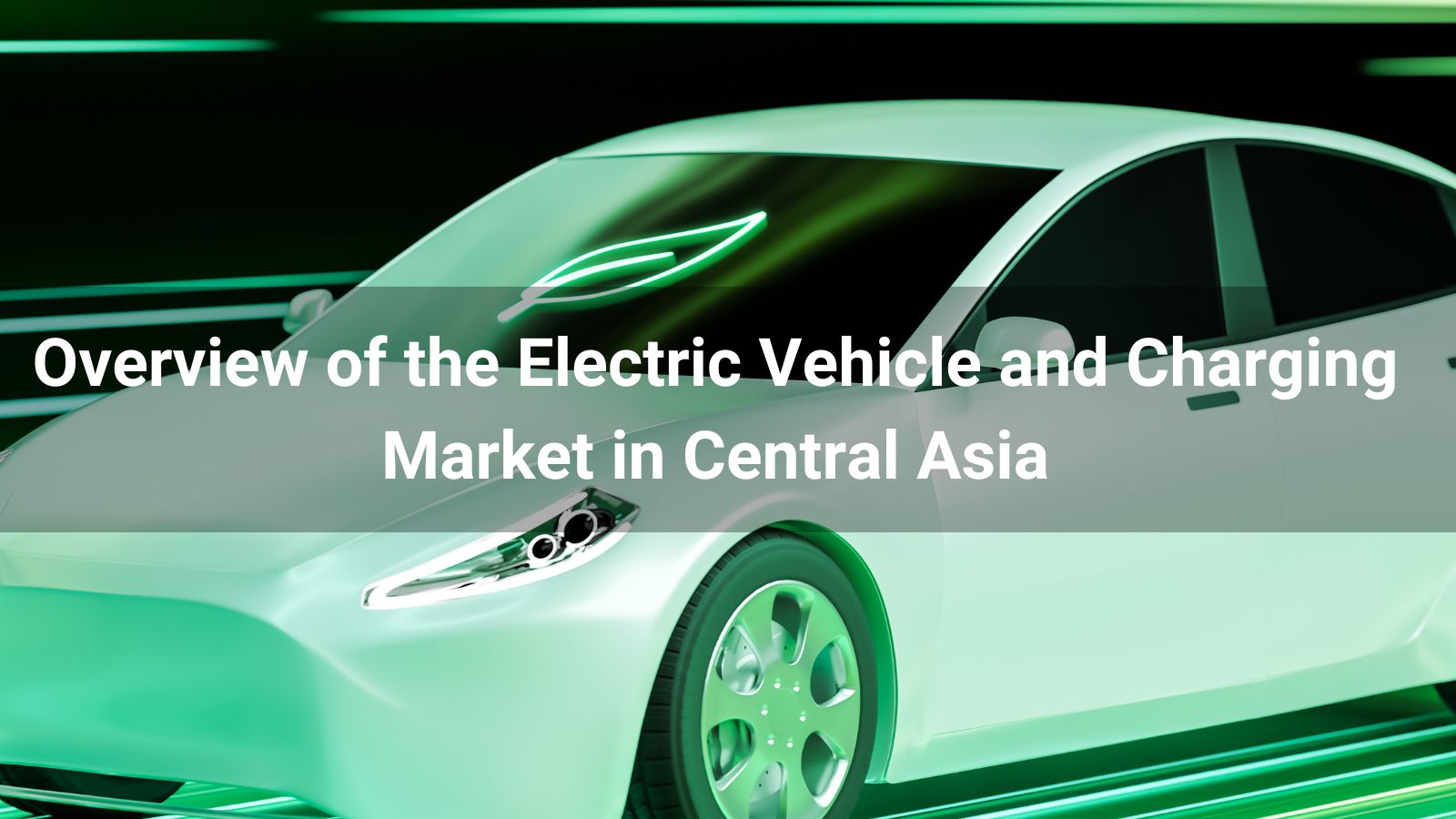
Overview of the Electric Vehicle and Charging Market in Central Asia
2026 Feb,05 -
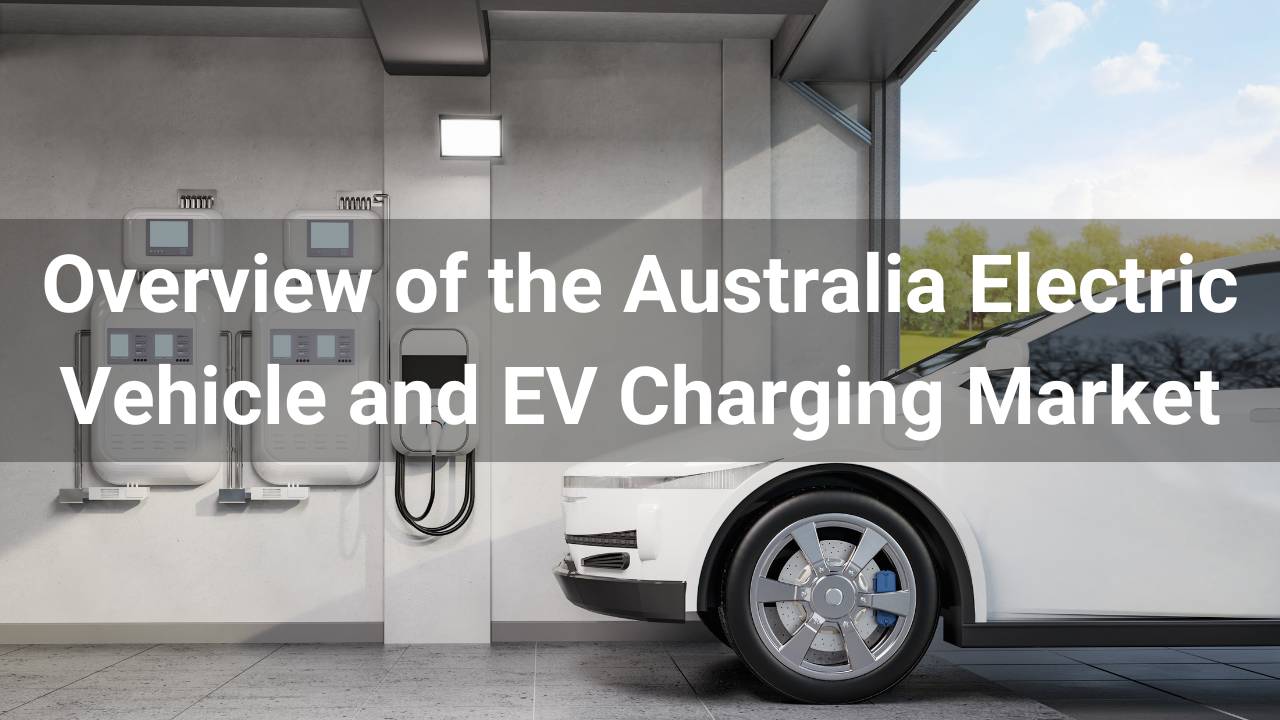
Overview of the Australia Electric Vehicle and EV Charging Market
Australia's electric vehicle (EV) market is rapidly expanding, with Tesla leading the high-end segment and Chinese brands like BYD gaining traction among mid-to-low-end consumers.2026 Feb,05 -
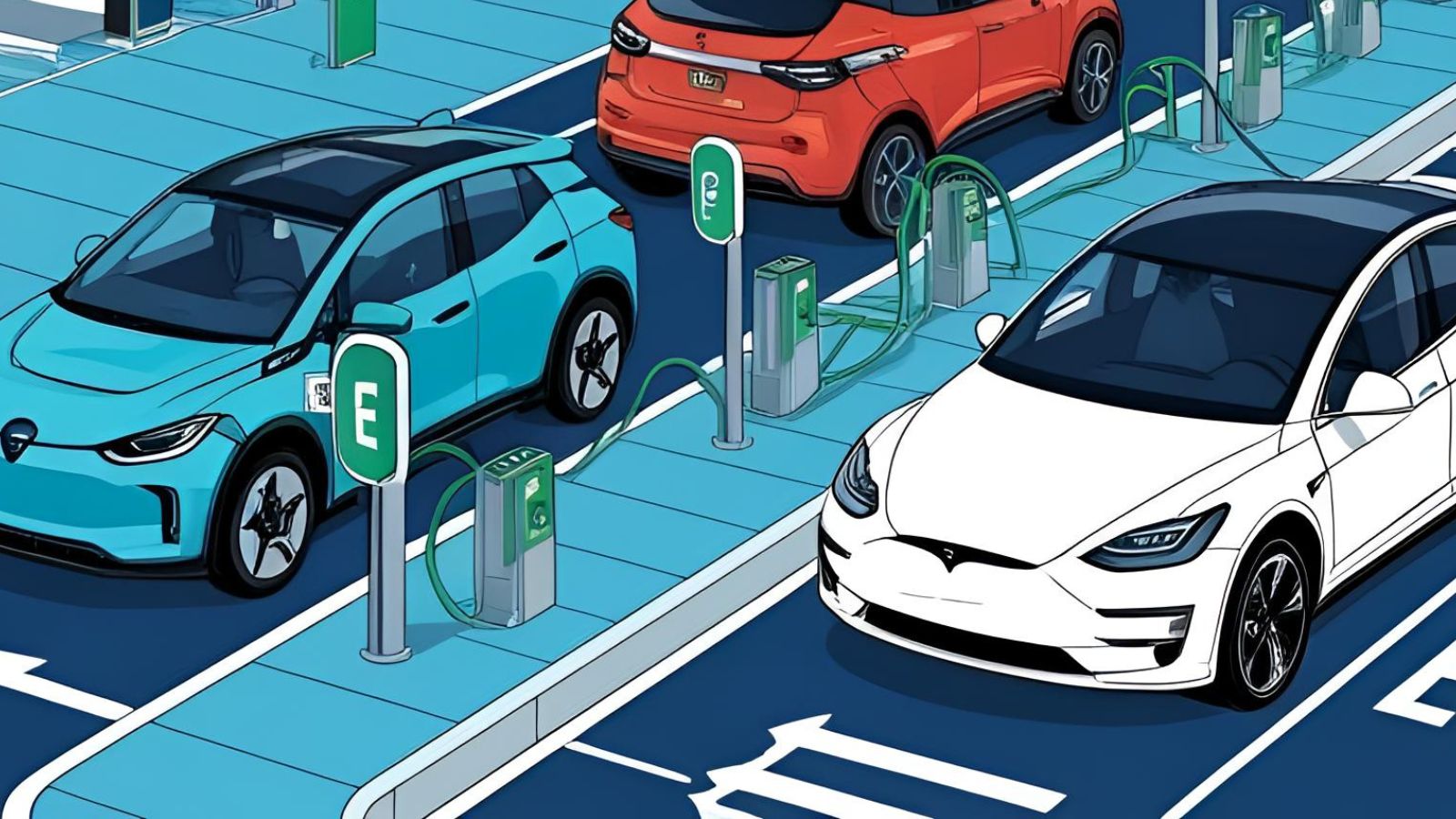
List of 60 EV Charging Companies in 2026
EV charging companies are at the forefront of this revolution, driving the transition to sustainable transportation through innovative technologies and expansive networks. Below is a list of 60 leading EV charging companies worldwide in 2026, showcasing the key players shaping the future of mobility.2026 Jan,26





